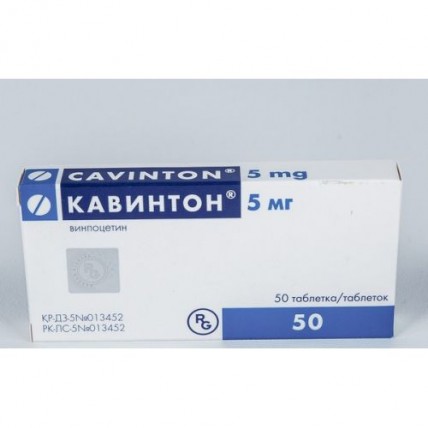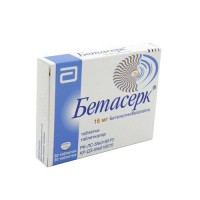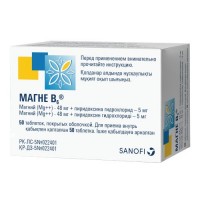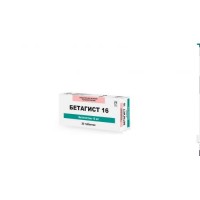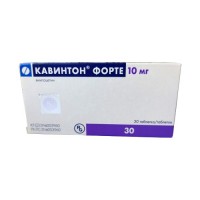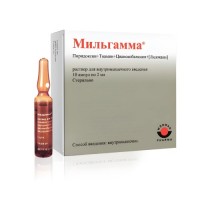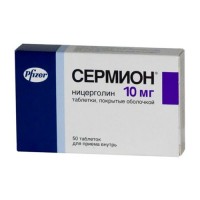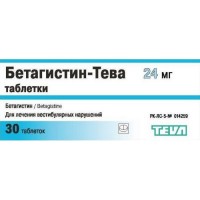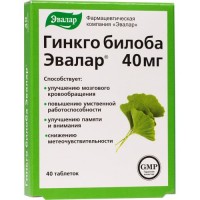-19%
Cavinton® (Vinpocetine) 5 mg, 50 tablets
- $17.00
- $21.00
Research suggests that (Cavinton) Vinpocetine helps to maintain healthy blood circulation in the brain and supports certain neurotransmitters in the memory process. Vinpocetine supports and protects brain blood vessel and aids mental function. Vinpocetine is a derivative of Vincamine, which is found naturally in the Periwinkle plant (Vinca minor, Vinca Pervinca).
Common brand names: Avintol, Intelectol, Vicog, Vinctine, Ding Na, Vinpotaxer, Vipodendril, Cerevas, VinpoHasco, Vinpoton, Vinpocetine Espefa, Vinpoton Forte, Vicebrol, Vinpocetine Hasco, Vinpocetina Covex, Cerivin, Vincet, Cereton (Vinpocetine), Caviton, Vinsetine, Vinton, Bai Rui De, Zui Xing, Tong Ming, Ultra-Vinca, Vinpocetina Kern
Synonyms: CERACTIN, ethyl apovincaminate, ETHYL APOVINCAMIN-22-OATE, Vinpocetina, Vinpocetine
Neurology:
Ophthalmology:
Otorhinolaryngology:
It is taken orally, after meals.
Usually the daily dose is 15-30 mg (5-10 mg 3 times / day).
The initial daily dose is 15 mg. The maximum daily dose is 30 mg.
In diseases of the kidneys and liver, the drug is prescribed in the usual dose, the absence of cumulation allows for long courses of treatment.
In clinical studies, the most common adverse reactions occurred in the following system-organ classes (according to the MedDRA classification), which are given in accordance with the frequency of occurrence: infrequently (from ≥1 / 1000 to <1/100), rarely (from ≥1 / 10000 up to <1/1000); very rare (<1/10000).
From the hematopoietic system: rarely - leukopenia, thrombocytopenia; very rarely - anemia, erythrocyte agglutination.
From the immune system: very rarely - hypersensitivity reactions.
From the side of metabolism and nutrition: infrequently - hypercholesterolemia; rarely - decreased appetite, anorexia, diabetes mellitus.
Mental disorders: rarely - insomnia, sleep disturbances, anxiety; very rarely - euphoria, depression.
From the nervous system: infrequently - headache; rarely - dizziness, taste disorder, stupor, unilateral paresis, drowsiness, amnesia; very rarely - tremors, spasms.
From the side of the organ of vision: rarely - edema of the nipple of the optic nerve; very rarely - conjunctival hyperemia.
On the part of the organ of hearing and labyrinth disorders: infrequently - vertigo; rarely - hyperacusis, hypoacusia, tinnitus.
From the side of the cardiovascular system: infrequently - lowering blood pressure; rarely - ischemia / myocardial infarction, angina pectoris, bradycardia, tachycardia, extrasystole, palpitations, increased blood pressure, "hot flashes", thrombophlebitis; very rarely - blood pressure lability, arrhythmia, atrial fibrillation.
From the digestive system: infrequently - abdominal discomfort, dry mouth, nausea; rarely - epigastric pain, constipation, diarrhea, dyspepsia, vomiting; very rarely - dysphagia, stomatitis.
Skin and subcutaneous tissue disorders: rarely - erythema, hyperhidrosis, pruritus, urticaria, rash; very rarely - dermatitis.
General disorders and disorders at the injection site: rarely - asthenia, malaise, fever; very rarely - a feeling of discomfort in the chest, hypothermia.
Laboratory and instrumental data: rarely - hypertriglyceridemia, depression of the ST segment on the ECG, a decrease / increase in the number of eosinophils, an increase in the activity of hepatic enzymes; very rarely - decrease / increase in the number of leukocytes, erythropenia, decrease in thrombin time, increase in body weight.
If any of the adverse reactions indicated in the instructions are aggravated or any other adverse reactions not indicated in the instructions are noted, the patient must be informed about this by the doctor.
With caution: long QT interval syndrome, taking drugs that cause QT interval prolongation.
Application during pregnancy and lactation
During pregnancy and during breastfeeding, as well as in women with preserved fertility who do not use a reliable method of contraception, the use of vinpocetine is contraindicated.
Pregnancy
Vinpocetine crosses the placental barrier, but its concentration in the placenta and in the fetal blood is lower than in the blood of a pregnant woman. Animal studies have shown reproductive toxicity, including malformations in rats. In animal studies, with the introduction of large doses, placental bleeding and spontaneous abortions occurred, probably as a result of increased placental blood flow.
Breastfeeding period
Vinpocetine passes into breast milk. In studies using labeled vinpocetine, the radioactivity in breast milk was 10 times higher than in the mother's blood. Within 1 hour, 0.25% of the taken dose of the drug penetrates into breast milk. Since vinpocetine passes into breast milk, and there is no data on the effect of vinpocetine on infants, the use of the drug during breastfeeding is contraindicated.
Application for violations of liver function
For liver diseases, the drug is prescribed in the usual dose.
Application for impaired renal function
For kidney disease, the drug is prescribed in the usual dose.
Application in children
The use is contraindicated under the age of 18 years.
The presence of prolonged QT interval syndrome and the use of drugs that cause prolongation of the QT interval require periodic ECG monitoring.
1 tablet of Cavinton® contains 140 mg of lactose monohydrate. Patients with rare hereditary diseases such as galactose intolerance, lactase deficiency or glucose-galactose malabsorption should not take this drug.
Influence on the ability to drive vehicles and mechanisms
There are no data on the effect of vinpocetine on the ability to drive vehicles and work with mechanisms.
There are no data on an overdose of vinpocetine. A single dose of 360 mg of vinpocetine did not cause clinically significant reactions, incl. on the part of the cardiovascular system.
Treatment: gastric lavage, intake of activated charcoal, symptomatic therapy.
Interaction is not observed with simultaneous use with beta-blockers (chloranolol, pindolol), clopamide, glibenclamide, digoxin, acenocoumarol, hydrochlorothiazide and imipramine.
The simultaneous use of vinpocetine and alpha-methyldopa sometimes caused some increase in the hypotensive effect, therefore, with such treatment, regular monitoring of blood pressure is required.
Despite the lack of data confirming the possibility of interaction, it is recommended to exercise caution when simultaneously prescribing with drugs acting on the central nervous system, and with drugs with antiarrhythmic and anticoagulant action.
The drug should be stored in its original packaging to protect it from light, out of reach of children at a temperature not exceeding 30 ° C.
Shelf life of the Cavinton® is 5 years. Do not use after the expiration date printed on the package.
Common brand names: Avintol, Intelectol, Vicog, Vinctine, Ding Na, Vinpotaxer, Vipodendril, Cerevas, VinpoHasco, Vinpoton, Vinpocetine Espefa, Vinpoton Forte, Vicebrol, Vinpocetine Hasco, Vinpocetina Covex, Cerivin, Vincet, Cereton (Vinpocetine), Caviton, Vinsetine, Vinton, Bai Rui De, Zui Xing, Tong Ming, Ultra-Vinca, Vinpocetina Kern
Synonyms: CERACTIN, ethyl apovincaminate, ETHYL APOVINCAMIN-22-OATE, Vinpocetina, Vinpocetine
Indications for Cavinton®
Neurology:
- symptomatic therapy of the consequences of ischemic stroke, vertebrobasilar insufficiency, vascular dementia, cerebral atherosclerosis, post-traumatic and hypertensive encephalopathy;
- to reduce the severity of neurological and mental disorders associated with impaired blood supply to the brain.
Ophthalmology:
- chronic vascular diseases of the retina and choroid.
Otorhinolaryngology:
- hearing loss of the perceptual type;
- Meniere's disease;
- sensation of tinnitus.
Dosage regimen
It is taken orally, after meals.
Usually the daily dose is 15-30 mg (5-10 mg 3 times / day).
The initial daily dose is 15 mg. The maximum daily dose is 30 mg.
In diseases of the kidneys and liver, the drug is prescribed in the usual dose, the absence of cumulation allows for long courses of treatment.
Side effect
In clinical studies, the most common adverse reactions occurred in the following system-organ classes (according to the MedDRA classification), which are given in accordance with the frequency of occurrence: infrequently (from ≥1 / 1000 to <1/100), rarely (from ≥1 / 10000 up to <1/1000); very rare (<1/10000).
From the hematopoietic system: rarely - leukopenia, thrombocytopenia; very rarely - anemia, erythrocyte agglutination.
From the immune system: very rarely - hypersensitivity reactions.
From the side of metabolism and nutrition: infrequently - hypercholesterolemia; rarely - decreased appetite, anorexia, diabetes mellitus.
Mental disorders: rarely - insomnia, sleep disturbances, anxiety; very rarely - euphoria, depression.
From the nervous system: infrequently - headache; rarely - dizziness, taste disorder, stupor, unilateral paresis, drowsiness, amnesia; very rarely - tremors, spasms.
From the side of the organ of vision: rarely - edema of the nipple of the optic nerve; very rarely - conjunctival hyperemia.
On the part of the organ of hearing and labyrinth disorders: infrequently - vertigo; rarely - hyperacusis, hypoacusia, tinnitus.
From the side of the cardiovascular system: infrequently - lowering blood pressure; rarely - ischemia / myocardial infarction, angina pectoris, bradycardia, tachycardia, extrasystole, palpitations, increased blood pressure, "hot flashes", thrombophlebitis; very rarely - blood pressure lability, arrhythmia, atrial fibrillation.
From the digestive system: infrequently - abdominal discomfort, dry mouth, nausea; rarely - epigastric pain, constipation, diarrhea, dyspepsia, vomiting; very rarely - dysphagia, stomatitis.
Skin and subcutaneous tissue disorders: rarely - erythema, hyperhidrosis, pruritus, urticaria, rash; very rarely - dermatitis.
General disorders and disorders at the injection site: rarely - asthenia, malaise, fever; very rarely - a feeling of discomfort in the chest, hypothermia.
Laboratory and instrumental data: rarely - hypertriglyceridemia, depression of the ST segment on the ECG, a decrease / increase in the number of eosinophils, an increase in the activity of hepatic enzymes; very rarely - decrease / increase in the number of leukocytes, erythropenia, decrease in thrombin time, increase in body weight.
If any of the adverse reactions indicated in the instructions are aggravated or any other adverse reactions not indicated in the instructions are noted, the patient must be informed about this by the doctor.
Contraindications for use
- hypersensitivity to vinpocetine or other components of the drug;
- pregnancy;
- period of breastfeeding;
- use in women with preserved fertility who do not use a reliable method of contraception;
- rare hereditary diseases such as galactose intolerance, lactase deficiency, glucose-galactose malabsorption;
- age up to 18 years (due to the lack of data from clinical studies).
With caution: long QT interval syndrome, taking drugs that cause QT interval prolongation.
Application during pregnancy and lactation
During pregnancy and during breastfeeding, as well as in women with preserved fertility who do not use a reliable method of contraception, the use of vinpocetine is contraindicated.
Pregnancy
Vinpocetine crosses the placental barrier, but its concentration in the placenta and in the fetal blood is lower than in the blood of a pregnant woman. Animal studies have shown reproductive toxicity, including malformations in rats. In animal studies, with the introduction of large doses, placental bleeding and spontaneous abortions occurred, probably as a result of increased placental blood flow.
Breastfeeding period
Vinpocetine passes into breast milk. In studies using labeled vinpocetine, the radioactivity in breast milk was 10 times higher than in the mother's blood. Within 1 hour, 0.25% of the taken dose of the drug penetrates into breast milk. Since vinpocetine passes into breast milk, and there is no data on the effect of vinpocetine on infants, the use of the drug during breastfeeding is contraindicated.
Application for violations of liver function
For liver diseases, the drug is prescribed in the usual dose.
Application for impaired renal function
For kidney disease, the drug is prescribed in the usual dose.
Application in children
The use is contraindicated under the age of 18 years.
Special precautions
The presence of prolonged QT interval syndrome and the use of drugs that cause prolongation of the QT interval require periodic ECG monitoring.
1 tablet of Cavinton® contains 140 mg of lactose monohydrate. Patients with rare hereditary diseases such as galactose intolerance, lactase deficiency or glucose-galactose malabsorption should not take this drug.
Influence on the ability to drive vehicles and mechanisms
There are no data on the effect of vinpocetine on the ability to drive vehicles and work with mechanisms.
Overdose
There are no data on an overdose of vinpocetine. A single dose of 360 mg of vinpocetine did not cause clinically significant reactions, incl. on the part of the cardiovascular system.
Treatment: gastric lavage, intake of activated charcoal, symptomatic therapy.
Cavinton interactions
Interaction is not observed with simultaneous use with beta-blockers (chloranolol, pindolol), clopamide, glibenclamide, digoxin, acenocoumarol, hydrochlorothiazide and imipramine.
The simultaneous use of vinpocetine and alpha-methyldopa sometimes caused some increase in the hypotensive effect, therefore, with such treatment, regular monitoring of blood pressure is required.
Despite the lack of data confirming the possibility of interaction, it is recommended to exercise caution when simultaneously prescribing with drugs acting on the central nervous system, and with drugs with antiarrhythmic and anticoagulant action.
Storage conditions of the Cavinton®
The drug should be stored in its original packaging to protect it from light, out of reach of children at a temperature not exceeding 30 ° C.
Shelf life of the Cavinton® is 5 years. Do not use after the expiration date printed on the package.
